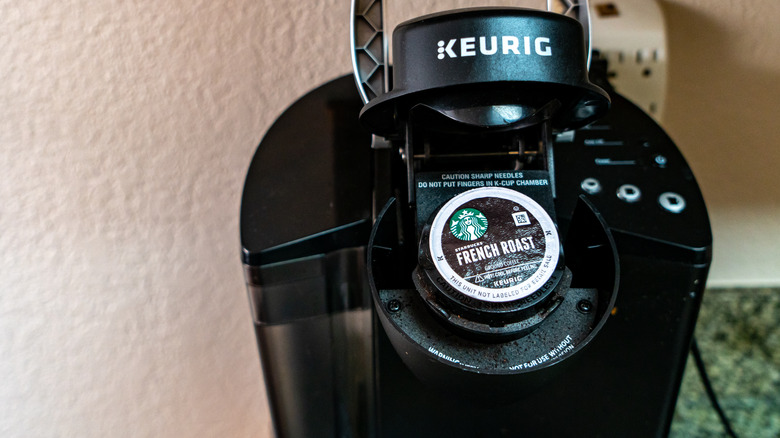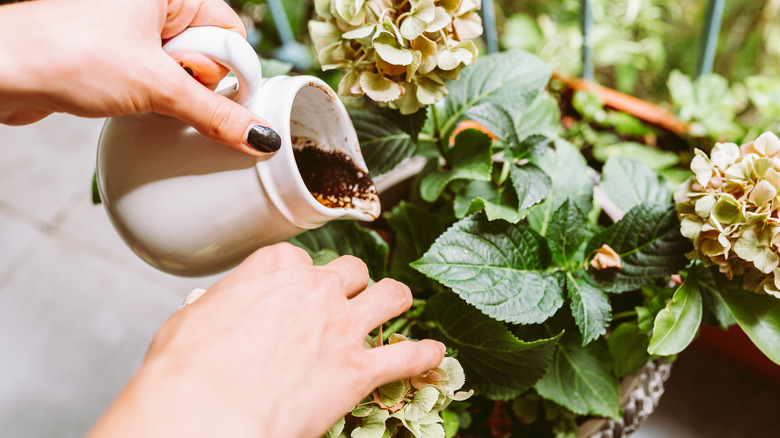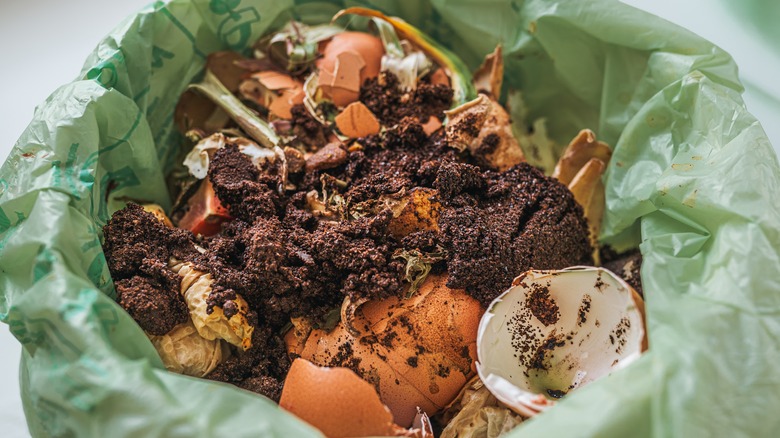Stop Tossing Used Keurig Coffee Pods & Use Them In Your Backyard Like This
Stop throwing away black gold. Yes, you. Inside your Keurig coffee pods, there are secret garden treasures. The used grounds hold nutrients that plants need for healthy growth. Adding the crushed beans to your plant care regime can also improve soil structure, which helps keep moisture in the soil, control ground temperatures, and increases drainage. However, there are specific ways to incorporate the remainders from your cup of joe to get all these benefits. The spent coffee grounds can be used as a soil amendment, mulch, and compost ingredient to help your plants thrive.
If you tear off the foil lid on the Keurig coffee pods, you'll notice the used grounds even look like soil, so it's very fitting that the crushed beans can enhance just that. Further, while the dregs are helping your garden thrive, there are ways you can repurpose the K-cups container, including as a seed starter pot. That's two garden perks from the items you were just tossing in the trash can. Incorporating the coffee dregs is simple and there's many garden advantages that'll make you want to save the pods.
Benefits of coffee grounds in your garden
When worked into your garden soil, microbes feed on the coffee grounds (because even bacteria loves coffee), and release microbial glues. This naturally occurring sticky substance helps the soil bind, which improves its structure and drainage. Earthworms also feed on the spent grounds, and it's possible that they contribute to the dregs' improvement in soil aggregation aka stability, as they carry the grounds deeper within the soil. The better the soil structure, the better it will stand up against tilling, swelling, and erosion. When used as a top layer, coffee grounds can also help regulate soil temperature and water retention.
Further, coffee grounds add major nutrients like nitrogen, phosphorus, and potassium, plus micronutrients like magnesium, copper, and calcium. However, it is not enough to be a fertilizer replacement. Oh, and don't worry about the grounds messing with your soil's pH levels. It's commonly thought that coffee grounds will increase the soil's acidity since the brewed beverage is acidic, but the used grounds have a nearly neutral pH. They shouldn't disrupt the acidity or alkaline level in your garden beds. Keep in mind though, that while some plants thrive with grounds, there are other plants that don't like coffee grounds, such as geraniums and asparagus ferns. Coffee grounds can also be particularly unforgiving to seedling and germinating seeds. To be on the safe side, avoid using spent grounds on these newcomers.
How to use coffee grounds as compost, mulch, and soil amendment
There are a couple different ways to use leftover coffee grounds in your yard and garden. As a soil amendment, first, make sure they are dry and cool. Then, you can apply a ½-inch layer to your garden bed and rake the coffee dregs through the top 4 inches. You can also use the grounds as mulch. Sprinkle the remains from your coffee pods in a ½-inch layer around your plants and cover with a 4-inch pile of leaves or wood chips. The extra top layer is needed to prevent the grounds from compacting, which can obstruct water and air flow. It's important to stick with the proper ratios, as too many coffee grounds can slow plant growth and prevent seeds from germinating.
Proportions are also essential when using coffee grounds for your compost bin. The crushed beans should only be 10-20% of your compost volume. Over that percentage, you risk the grounds inhibiting your pile from heating up, which is needed for decomposition to take place. If you drink multiple cups of coffee a day, you can still collect all your coffee grounds by emptying the Keurig pods into an airtight container. Then, add the remainders to your compost pile when needed. Even moldy grounds can still be used for compost. You'll save the coffee grounds from the landfill and help your plants, so you don't need to feel guilty about brewing an extra cup.


